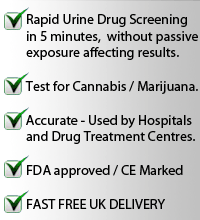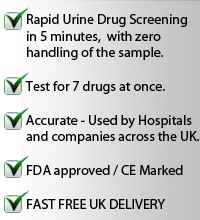
Cannabis Information - Class, Signs, Symptoms and Effects
…from your Partners in Patient
Care.
|
||||||||||||||
|
|
Cannabis (Marijuana) Information - Weed, Pot, Grass, Hash, Puff, ResinCannabis / Marijuana is the most commonly abused illegal drug. It is a derivative of the hemp plant (Cannabis sativa) and can take several physical forms including dried plant material (a green or grey mixture of dried, shredded flowers and leaves), blocks of resin and small containers of Cannabis oil. Information on Cannabis slang terms / names:Slang terms / different names for Cannabis / Marijuana include weed, pot, grass, puff, ganja, hash, hashish, herb, skunk, draw and gangster. Cannabis Information: How is Cannabis Used?Most users roll loose Cannabis into a cigarette called a "joint". It can be smoked in a water pipe, called a "bong", or mixed into food or brewed as tea. Signs and Symptoms of Cannabis / Marijuana Use:If someone is intoxicated by Cannabis, he or she may have balance problems and have trouble walking. Their eyes may appear red and bloodshot, dilated pupils are common and he or she may exhibit memory difficulties. When the early effects fade, over a few hours, the user can become hungry (often referred to as getting the munchies) and later sleepy. How long does Cannabis test positive for on a drug test?The active ingredient of cannabis (THC or Tetrahydrocannabinol) is detectable in urine using the Drug-Aware™ Cannabis test kit (THC) for typically 14 to 28 days for frequent use of the drug, or around 5 days for a one-off use, at a cut-off level of 50 ng/ml. The reason for this long retention time is that THC binds with the body's fat reserves - and leaches out over a number of days. You will also undoubtedly have patients who claim that they are positive due to passive smoking. Let us assure you that this is not the case. The cut-off level of the test is set at a level much too high for passive smoking to affect the test results.
To eliminate the long detection window, some employers use Saliva Drug Tests because the detection window is only measured in hours when testing oral fluid. What class of drug is Cannabis / Marijuana?People sometimes ask what is the current class of Cannabis? In the UK, the most dangerous or addictive drugs are Class A - such as Heroin, Cocaine and Ecstasy, Class B drugs include Amphetamines. As of 2009, Cannabis / Marijuana spent a short period of time downgraded from a Class B drug, to a Class C, but this decision was reversed due to the significant risk of mental health issues which are manifested in heavy Cannabis users. *UPDATE* Cannabis has been reinstated as a Class B Drug. Information on the Dangers and Effects of Heavy Cannabis UseStudies have linked heavy Cannabis / Marijuana use to anxiety and mental health disorders such as paranoia, depression, insomnia, schizophrenia and even amotivational syndrome which relates to a lack of ambition or drive. Cannabis in SchoolsIn order to learn more about drug use (and in particular Cannabis / Marijuana supply and young people), 182 young people who were Cannabis / Marijuana users aged between 11 and 19 years old were interviewed for a study published in January 2008 by the Joseph Rowntree Foundation. The sample included both city dwellers and young people living in rural villages. The study discovered that half of the young people had taken Cannabis / Marijuana into school or college and 43 per cent admitted that they used Cannabis / Marijuana whilst at school or college. It is clear from the report that the majority of these young people purchase Cannabis from their friends or relatives and in turn supply their friends in a new wave of ‘social’ and ‘not-for-profit’ drug dealing which is a departure from the typical dealer-user scenario. One young interviewee told the researchers that the people who sold her Cannabis / Marijuana included ‘friends from school’ and shows how combining drug-use with normal social networking is having the effect of normalising the act of taking drugs. Latest News and Information on Cannabis.It has been announced by UK Home Secretary Jacqui
Smith that Cannabis will be reclassified as a Class B drug, in order
to convey that the drug is harmful and should not be taken. Worryingly, the average starting age for Cannabis
use is just 13 years old and young people often binge on more potent
forms of Cannabis such as skunk, in the same way as alcohol, trying
to achieve the maximum effect. If they do, the independent Advisory
Council on the Misuse of Drugs found that the consequences of this
"may be serious to their mental health".
|
||||||||||||
|
|
© Drug-Aware Ltd 2002-2012. Unauthorised duplication or use of material from this web site is strictly prohibited. ALL RIGHTS RESERVED.
“Drug-Aware”, the Drug-Aware Logo and “Your Partners in Patient Care” are all Trade Marks of Drug-Aware Ltd.
Disclaimer - Whilst Drug-Aware Ltd has made every effort to ensure that all articles and information on this web site is current and accurate, we cannot be held responsible for any losses, damages, costs and other consequences resulting directly or indirectly from using this site and any information or material available from it. To the maximum extent permitted by law, Drug-Aware Ltd excludes all liability to any person arising directly or indirectly from using this site and any information or material available from it.
Thank you for visiting www.drug-aware.co.uk - the source for all of your drug testing requirements





